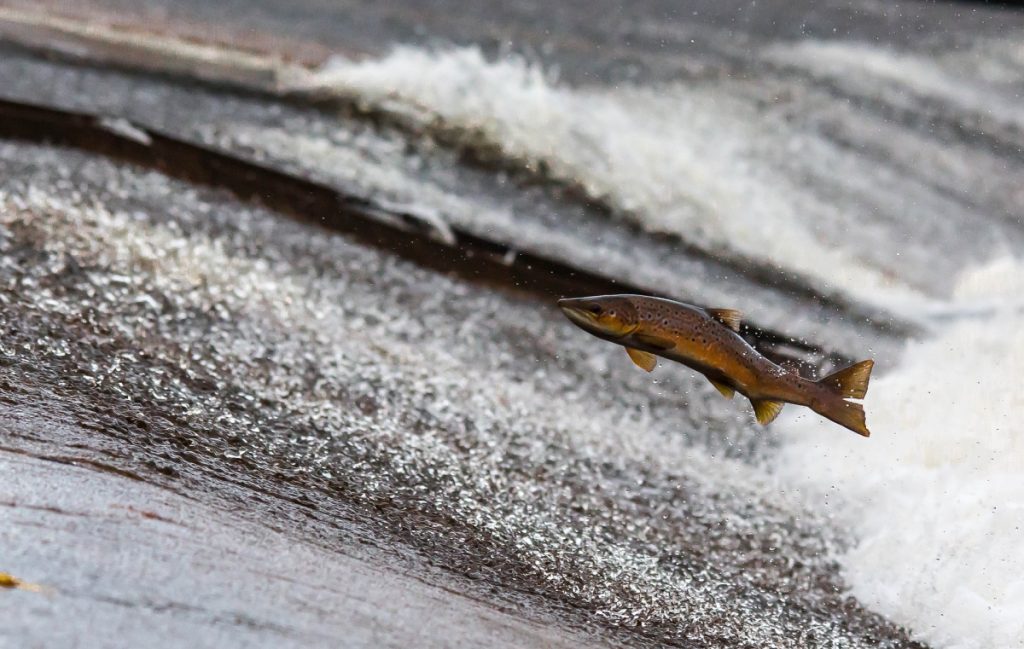Think eating fish like salmon and sardines is just for cats? Think again. Yes, dogs can eat fish!
Many dogs love the smell and taste of fish…which may not surprise you if you’ve ever found your dog enthusiastically nosing around the trash after a fish fillet feast.
Some research shows dogs may actually prefer the taste of fish-based recipes over traditional meat-based options.
According to Dr. Jessica Wilson, DVM, there’s plenty for pet parents to love about adding fish to a balanced diet, too.
“Fish has lots of great health benefits,” Dr. Wilson says. Adding lean, nutrient-dense proteins like cod or pollack to your dog’s diet could help transform your pet from the inside out.
Is Fish Good for Dogs?

From a nutrition standpoint, most fish varieties are hard to beat in terms of what they bring to your dog’s food bowl. Fish is high in protein, calcium, magnesium, contains omega-3 fatty acids that support joint health, and is chock full of beneficial amino acids that promote organ and tissue growth.
The proof is in the results. Research shows that adding fish to dogs’ diets lowered the development of severe osteoarthritis, decreased cholesterol, and improved cognitive function.
“Fish is also a great option for weight loss because it’s lean,” Dr. Wilson adds.
Veterinarians often recommend dog foods containing fish when dog breeds have health problems like skin issues or stomach troubles due to food allergies or sensitivities. As a novel protein — a protein source that dogs have never been exposed to before — it can help calm the immune system or digestive upset.
What Kind of Fish Can Dogs Eat?
While there is plenty of fish in the sea, not all of them are appropriate for your dog’s diet.
As a general rule, you want to look for varieties that are high in protein, antioxidants, and essential fatty acids, yet low in calories and fat. Avoid excessive seasonings and fish bones, which are a choking hazard.
Here’s a quick rundown outlining what kinds of fish are best for your dog’s health, as well as which fish species to avoid:
Can Dogs Eat Cod?
Yes, dogs can eat cod. In fact, it’s one of the best types of fish for dogs, and one of the most common fish ingredients found in dog foods.
Dr. Wilson loves cod as an option for dogs because the flaky whitefish is lean, low in fat, and a great source of protein. Like other dog-friendly whitefish varieties — including pollock, bass, haddock, and halibut — cod has a mild flavor, which is a plus if you don’t want your home to smell like a bait shop.
JustFoodForDogs uses delicious Alaska Pacific wild-caught cod as the main protein in its Fish & Sweet Potato recipe. This choice is a great option for dogs with sensitive stomachs as well as those who need to lose weight.
Cod is also the primary ingredient in JustFoodForDogs’ veterinary support, Hepatic Support Low Fat diet, which relies on omega-3 fatty acids from fish to support a healthy skin barrier.
Can Dogs Eat Tuna Fish?
Tuna is not a great choice for dogs, says Dr. Wilson. It contains heavy metals/mercury levels that are higher than those found in other fatty fish, such as salmon and tilapia.
A tiny bit of tuna here and there may not be dangerous. But eating tuna regularly could allow high levels of mercury to build up in your dog’s body, resulting in mercury poisoning, which can lead to serious and sometimes fatal health complications. Other fish to avoid with high levels of mercury include albacore tuna, swordfish and king mackerel.
If you do choose to serve up a small portion of tuna as a rare treat, look for tuna without any additives.
“Another issue with tuna, and canned tuna specifically, is the carrier oil that is used,” Dr. Wilson says. “Tuna packed in water might be ok in small amounts, but it can still be very high in sodium. Some tuna is packed in unhealthy oils or seasoned, so you need to be very careful about feeding your dog tuna.”
Fatty fish like mackerel or sardines, which are featured in the JustFoodForDogs Omega Plus fish oil supplement, may be better choices for pet parents seeking the health benefits of fish for their pets.
Can Dogs Eat Salmon?
Salmon is another healthy, nutrient-rich fish that’s great for dogs and found in a lot of dog foods — including JustFoodForDogs Salmon Bark treats. But when it comes to including salmon in your dog’s diet, it’s best to avoid farmed salmon.
JustFoodForDogs uses wild salmon to help ensure the least amount of biotoxins and contaminants. Wild salmon also contains highly digestible omega-3 fatty acids and is packed in vitamin D, selenium, and thiamine.
Salmon does contain some mercury, but not enough to be considered a health risk for dogs. Researchers at the University of California, Davis, tested 24 commercial dog foods made with salmon and found concentrations that posed no risk to healthy, adult dogs, making it a safe choice for your dog’s diet.
Can Dogs Eat Raw Fish?

Stick to cooked fish. You should never feed your dog raw fish, which could carry harmful bacteria.
“The biggest risks with raw fish are worms, parasites, and foodborne contamination,” Dr. Wilson explains. “There’s always the risk of contamination with listeria, salmonella or E. coli…so we don’t encourage raw fish feeding.”
Feeding fish to your dog that is raw could also cause an illness called salmon poisoning disease, also known as fish disease.
Salmon and other fish that swim upstream to breed can carry parasites that are infected with an organism called helminthoeca. If your dog eats an infected fish they could suffer symptoms like decreased appetite, lethargy, weight loss, vomiting, and diarrhea. If the infection is left untreated, the is a 90% chance of death.
Can Dogs Eat Fish Skins?
Dogs can eat fish skins as long as they are properly cooked. Fish skins are chock full of protein, nutrients, and healthy omega-3 fatty acids. So go ahead and offer your dog some fish skin as a special snack. Or, if you want a more portable option, you can find commercial dog treats that contain dehydrated fish skin, too. But Dr. Wilson offers one caveat.
“Fish skin, depending on how it’s processed, can be very fatty,” she says. “I would be a bit cautious about offering treats made from fish skins if your dog has a sensitive tummy or is prone to pancreatitis because the higher fat content in fish skin can cause stomach upset.”
Instead, Dr. Wilson suggests JustFoodForDogs Salmon Bark treats instead. They contain only dried yucca root and wild-caught salmon filet and offer a delicious, nutrient-rich alternative to fish skins treats. Without all of the fat!
How to Add Fish to Your Dog’s Diet
Whether your dog is a fresh fish fanatic or more accustomed to common proteins like lamb, beef, and chicken, switching to a fresh whole food diet that features fish as the main source of protein is a great way to unlock a world of health benefits for your pet, according to Dr. Wilson.
Introduce fish into your dog’s diet slowly, as you would with any new food, to avoid stomach upset. JustFoodForDogs suggests a multi-step process to ensure a smooth transition.
If you’re not quite sure what your dog will think about a shift to a fish-forward diet, Dr. Wilson suggests trying them out with a bit of fish you’ve cooked yourself.
Introducing Fish the DIY Way
To help you make a meal that’s delicious and nutritionally balanced, JustFoodForDogs offers a DIY kit. It comes complete with a shopping list, recipe, easy-to-follow instructions, and a veterinarian-formulated Do It Yourself Nutrient Blend – Fish. That way, you can ensure your meal contains all the vitamins, minerals, and nutrients your dog needs to thrive, according to the Association of American Feed Control Officials (AAFCO).
“You can give it a shot, see if your dog likes it, see how easy it is for you as a pet parent to cook it at home, and start incorporating fish — and the benefits of the fish — into your dog’s daily meal,” Dr. Wilson says.
Be extra careful about preparing wild-caught or store-bought fish. Remove all of the bones, boil or broil it with no seasonings. And don’t be offended if your dog doesn’t dive in immediately.
“Fish is generally received very, very, very well, and our Fish & Sweet Potato recipe is very palatable. However, the big attractors in food for dogs are protein and fat. Because fish is so lean, sometimes it’s just not appealing to certain dogs,” says Dr. Wilson.
“I’m always a proponent of trying it out first to see if your dog likes it. And, if they don’t, we have other plenty of options that they’ll love.”
This content is for informational use only and does not replace professional nutrition and/or medical advice, diagnosis, or treatment. It is not a substitute for and should not be relied upon for specific nutrition and/or medical recommendations. Please talk with your veterinarian about any questions or concerns.
